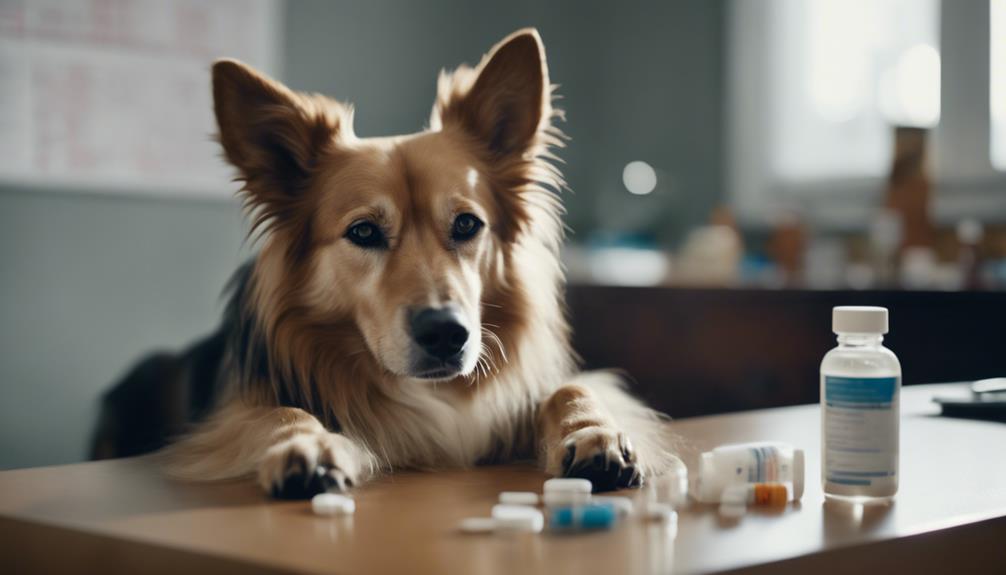The intricate interplay between canine health and emotional well-being unveils a compelling narrative in the domain of colitis. As dog owners, deciphering the enigmatic link between stress and our furry companions' gastrointestinal disturbances poses a poignant question: could your dog's diarrhea be a silent indicator of underlying stressors?
While the causative factors of colitis in dogs span a vast spectrum, the shadow of stress looms large, beckoning us to explore the subtle nuances of this intricate connection. Delving deeper into this correlation could unravel crucial insights for pet owners seeking to unravel the mysteries of their dog's digestive woes.
Key Takeaways
- Stress triggers can cause colitis in dogs by disrupting the digestive system.
- Identifying and managing stress is crucial for addressing stress-related colitis effectively.
- Stress reduction techniques and behavioral modifications can improve gastrointestinal health in dogs.
- Understanding stress-related colitis helps in tailoring treatment plans for long-term management.
Understanding Colitis in Dogs
Understanding Colitis in Dogs involves recognizing the inflammation of the colon and its various causes, including stress, parasites, food allergies, infections, and underlying medical conditions. Stress colitis, triggered by anxiety, is a prevalent factor in dogs.
Parasites such as worms, food intolerances, bacterial or viral infections, and diseases like inflammatory bowel disease can also lead to colitis. The inflammation disrupts the normal functioning of the colon, resulting in symptoms like diarrhea, blood or mucus in stool, increased bowel movements, straining, and abdominal discomfort.
Proper identification of these causes is crucial for effective treatment and management of colitis in dogs. Veterinarians play a vital role in diagnosing and devising tailored treatment plans to alleviate the condition and improve the dog's quality of life.
Recognizing Symptoms of Colitis
What are the common signs that indicate a dog may be suffering from colitis? Colitis in dogs can manifest through various symptoms, including soft or runny stool with mucus or blood, increased frequency of bowel movements, straining during defecation, changes in appetite, increased flatulence, and abdominal discomfort due to cramping or gas. Recognizing these signs is crucial in identifying potential colitis in your furry companion. To help you better understand these symptoms, here is a table outlining the key indicators of colitis in dogs:
| Symptom | Description |
|---|---|
| Soft or runny stool with mucus or blood | Indicates inflammation in the colon |
| Increased frequency of bowel movements | More frequent trips to defecate |
| Straining during defecation | Difficulty or discomfort during bowel movements |
| Changes in appetite | Variations in eating habits |
Causes of Stress-Related Colitis

Stress-related colitis in dogs is often triggered by heightened emotional responses that impact the gastrointestinal health of the animal. This type of colitis can be influenced by various factors that induce stress in dogs, leading to digestive disturbances. Some common causes of stress-related colitis in dogs include:
- Changes in routine or environment
- Loud noises or sudden disruptions
- Separation anxiety
These stressors can disrupt the normal functioning of the digestive system, leading to inflammation and irritation in the colon. Understanding and addressing these stress triggers are crucial in managing and preventing stress-related colitis in dogs.
Role of Stress in Colitis
The impact of stress on the development and exacerbation of colitis in dogs underscores the intricate relationship between emotional well-being and gastrointestinal health in canine patients. Stress can trigger or worsen colitis through various mechanisms, including changes in gut motility, immune system response, and gut microbiota composition. Understanding the role of stress in colitis is crucial for effective management and prevention strategies. Here is a table illustrating the key points:
| Stress and Colitis in Dogs | Effects on Colitis | Management Strategies |
|---|---|---|
| Triggers inflammation in colon | Increases gut permeability | Stress reduction techniques |
| Alters gut microbiota composition | Weakens immune response | Behavioral modifications |
| Impacts gut motility | Exacerbates symptoms | Regular exercise and mental stimulation |
Understanding and addressing stress can significantly improve the overall well-being and gastrointestinal health of dogs suffering from colitis.
Diagnostic Process for Colitis

Effective diagnosis of colitis in dogs involves a thorough examination encompassing a range of veterinary assessments and tests. Colitis can have various underlying causes, making a comprehensive diagnostic process crucial for appropriate treatment.
Three key components of the diagnostic process include:
- Detailed health history to understand the dog's background and potential triggers.
- Physical examination to assess symptoms, check for abdominal pain, and evaluate overall health.
- Fecal tests, X-rays, and blood tests to identify parasites, infections, inflammation, or other underlying conditions contributing to colitis.
Treatment Strategies for Colitis
Implementing a tailored treatment plan is essential in addressing colitis in dogs, considering the diverse underlying factors that contribute to this inflammatory condition. Treatment strategies for colitis typically involve a multifaceted approach.
Stress reduction techniques play a significant role in managing colitis, as stress is a common trigger for this condition. Medications such as dewormers and metronidazole may be prescribed to address parasitic or bacterial infections.
Dietary modifications, including fasting and the introduction of special diets, can help alleviate symptoms and promote gastrointestinal health. Natural remedies, along with hospital care if necessary, should be considered under the guidance of a veterinarian.
Medications for Colitis in Dogs

Addressing colitis in dogs requires a targeted approach that includes the appropriate use of medications tailored to combat underlying parasitic or bacterial infections contributing to the inflammatory condition. When it comes to medications for colitis in dogs:
- Dewormers: Used for parasitic infections.
- Metronidazole: Treats bacterial infections and has anti-inflammatory properties.
- Combination Therapy: May be necessary for parasite treatment.
Importance of Dietary Changes
When managing colitis in dogs, dietary changes play a crucial role in alleviating symptoms and supporting gastrointestinal health. A carefully tailored diet can help reduce inflammation, regulate bowel movements, and improve overall digestive function in dogs with colitis. Transitioning to easily digestible foods, such as bland diets or prescription gastrointestinal formulas, can provide relief and promote healing of the colon.
Avoiding common allergens and irritants, like certain proteins or additives, is also essential in managing colitis symptoms. Additionally, ensuring adequate fiber intake and proper hydration can aid in maintaining healthy gut flora and preventing constipation or diarrhea. Consulting with a veterinarian to create a customized dietary plan tailored to your dog's specific needs is recommended for effectively managing colitis through dietary changes.
Natural Remedies for Colitis

To complement dietary changes in managing colitis in dogs, exploring natural remedies can provide additional support in alleviating symptoms and promoting gastrointestinal health. Natural remedies can be gentle yet effective in aiding the overall well-being of dogs suffering from colitis. Here are three natural remedies that can be considered under veterinary guidance:
- Probiotics: Beneficial bacteria that can help restore the balance of the gut microbiome and aid in digestion.
- Slippery Elm: A soothing herb that can help reduce inflammation in the gastrointestinal tract and alleviate discomfort.
- Marshmallow Root: Known for its mucilaginous properties, it can help soothe and protect the lining of the digestive system.
Long-Term Management of Colitis
For dogs diagnosed with colitis, establishing a comprehensive long-term management plan is essential in maintaining their gastrointestinal health and overall well-being. Long-term management of colitis typically involves a combination of strategies tailored to the individual dog's needs.
This may include dietary modifications, such as feeding a high-fiber or hypoallergenic diet, to support digestive health and reduce inflammation in the colon. Regular monitoring by a veterinarian is crucial to assess the dog's response to treatment and make any necessary adjustments.
In some cases, long-term medication, such as metronidazole or probiotics, may be prescribed to help manage symptoms and prevent flare-ups. Additionally, managing stress levels through environmental enrichment, exercise, and behavior modification techniques can play a significant role in maintaining the dog's overall health and minimizing colitis-related episodes.
Prognosis and Outlook for Colitis

The prognosis for dogs diagnosed with colitis hinges significantly on the effectiveness of the implemented treatment plan and the individual dog's response to therapy. Factors such as the underlying cause of colitis, the presence of any concurrent medical conditions, and the timeliness of intervention also play crucial roles in determining the outlook for affected dogs. It is essential for pet owners to work closely with their veterinarians to monitor their dog's progress and make any necessary adjustments to the treatment plan. Regular follow-up appointments and adherence to medication and dietary recommendations are key to managing colitis effectively.
Response to treatment varies among individual dogs.
Early detection and intervention can lead to better outcomes.
Compliance with long-term management strategies is vital for maintaining a good prognosis.
Conclusion
In conclusion, the management of colitis in dogs necessitates a comprehensive approach that addresses underlying causes, symptoms, and long-term care strategies.
By understanding the role of stress in colitis, implementing appropriate diagnostic procedures, making dietary modifications, and exploring natural remedies, pet owners can effectively support their canine companions' well-being.
With timely intervention and holistic management, dogs with colitis can experience symptom relief and improved quality of life.




